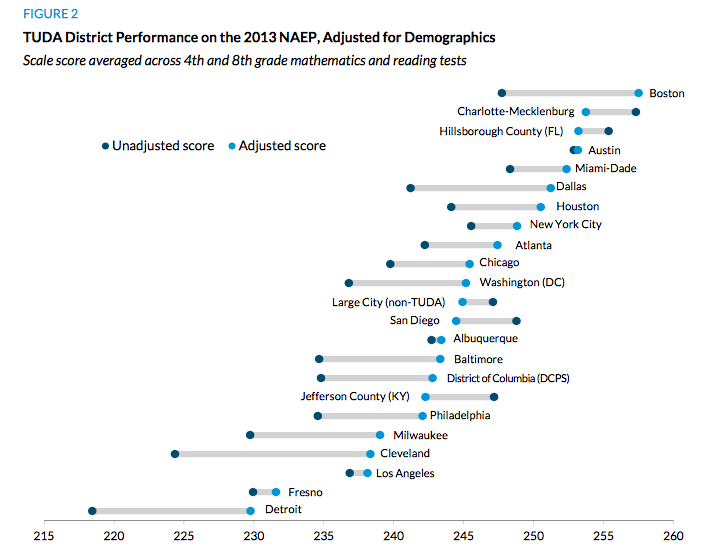Updated Jan. 17
During Betsy DeVos's confirmation hearing this evening, Colorado Sen. Michael Bennett raised questions about the performance of Detroit's charter sector, which DeVos has heavily promoted. Bennett said, "Detroit Public Schools averaged 9 percent — 9 percent of kids are proficient. Charter schools were a little better, 14 percent of the kids were proficient. I will stipulate that charter schools are doing better, but that is a horrible outcome for everybody involved."
DeVos responded, pointing out that Detroit has a high poverty rate, and said, "I believe there is a lot that has gone right in Detroit and Michigan with regard to charter schools."
This piece takes a deep look at the data on Detroit's charter schools, pointing out that charters seem to outperform Detroit Public Schools, but also may lack appropriate financial oversight, enhance school segregation, and financially harm district schools.
To some, the charter sector in Detroit is a cautionary tale, the often-called “Wild West” of charter schools, a place where for-profit operators run amok with minimal coordination or oversight.
Expanding this model to other states and cities — something of a possibility if Betsy DeVos becomes education secretary — would
amount to the “triumph of ideology over evidence,” critics say.
To supporters, Michigan charters have been
unfairly maligned, with data
cherry-picked to paint school choice in a negative light.
A careful review of the evidence offers mixed results. The one recent study on performance shows Detroit and Michigan charters doing better than district schools while a host of legitimate concerns have been raised about how charters operate and are overseen in the state.
Charters appear to outperform traditional public schools
Skeptics of Michigan and Detroit charters point to raw comparisons of state test data or to the state’s or city’s
performance on the National Assessment of Educational Progress to purportedly show that charters have failed to produce results. One oft-cited
report from Education Trust – Midwest, a civil rights and education group, found that “roughly 80 percent of charters (in Michigan) have academic achievement below the state average in reading and math.”
But this is simply not a fair way to judge the state’s charter schools. Assessing school performance requires a careful accounting for differences in out-of-school factors, like poverty, that contribute to student performance.
Detroit is the
poorest big city in the United States, according to U.S. Census data released last year. Detroit charter schools
serve just over 50,000 students, some 53 percent of the city’s total enrollment
A
study from CREDO — a Stanford-based research group well known for its charter research — found that charter schools in Michigan, and especially Detroit, moderately outperform district schools. The state’s for-profit charters, if anything, perform better than non-profit schools, according to CREDO, and, unlike in
most other states, online charters in Michigan do
just as well as other schools.
CREDO’s method has come under some
criticism, but by controlling for a number of factors, its approach is certainly preferable to raw test score comparisons.
CREDO’s data runs through 2011 for the state and 2012 for
Detroit. A
separate study using data from the late ’90s found Michigan charters had a large negative effect on student achievement, but there does not appear to be any recent research to contradict CREDO’s findings.
Some point out that charter performance comes in the context of a low-achieving state and, in Detroit, among the lowest-performing cities in the country. For instance, on federal math tests, just 4 percent of Detroit eighth-graders
scored at or above proficient, compared to 26 percent in other large cities.
This can be interpreted in different ways: That charters moderately outperform already struggling traditional schools is damning them with faint praise, in
critics’ minds. While supporters
say charters are doing a better-than-expected job in extremely challenging circumstances.
Michigan charters may worsen segregation, harm school districts
Assessing charter schools requires
going beyond a simple horse-race between charters and traditional public schools. A more important question may be how the expansion of charters impacts students overall.
In this respect, Michigan’s charters have a less favorable track record.
There is some
evidence that charters in the state have exacerbated school segregation, as low-income, special education students are less likely to transfer to charters. As
one study put it, “Student sorting under the charter school program tends to intensify the isolation of disadvantaged students in less effective urban schools serving a high concentration of similarly disadvantaged students.”
And although advocates have often argued that school choice will spur competition, making district schools better, there’s little evidence that this has happened to any positive effect in Michigan (
unlike in some other states). Although one
study showed gains from competition, other research finds that expanding charters
has not helped and may
have harmed students in Michigan’s traditional public schools (though none of these studies is particularly recent).
This may be due in part to the fact that charter expansion creates
massive fiscal strain on districts, especially in debt-burdened Detroit.
David Arsen, a researcher at Michigan State University who has studied the state’s charters extensively, argues that the harm on district schools helps explain CREDO’s findings: “Their method blinded them to the obvious possibility that the result turned on the negative impact of high-density, unregulated charter penetration … on the performance of Detroit Public Schools."
In other words, Arsen argues that charter schools’ performance edge may be a result of declining district performance, caused by concentrating the highest-needs students in district schools and the loss or per-pupil revenue as students leave district schools for charters.
There is some — but far from definitive — evidence for this hypothesis, and Detroit Public Schools have struggled with low performance for decades.
Financial impropriety, frequent closures among Michigan charters
There are a number of other concerns about charters in the state and city.
An extensive 2014
investigation by the Detroit Free-Press found that the state’s charter sector had poor transparency, limited accountability, and a number of financial improprieties. A recent
audit by the federal government found problems in the state’s charter oversight: for instance, in six of seven charter schools examined, there was at least one potential conflict of interest between the school and its management organization, in Michigan often a for-profit company that a charter school board contracts with to run schools.
Charter supporters in the state respond that such investigations amount to a small number of problems in a large sector; that charter schools are, in fact, held accountable, and frequently closed for
poor performance. They also point to new regulations
put into place to strengthen oversight; and that the key measure should be academic performance.
Another concern about charters in Detroit is how they have changed the school landscape in terms of number and location.
Charters do not have to offer transportation to students, which means that many have to use the city’s often-unreliable public transit system
1. More than a third of 88 Detroit charter schools acknowledged offering no transportation services to students, according to a survey conducted by Excellent Schools Detroit and provided to The 74. Several other schools did not respond to the survey
2. The Detroit school district provides transportation to students under specific
guidelines.
In some cases, students
travel hours to attend school. That’s at least partly because of the poorly coordinated location of schools in the city. While overall there are
more seats available than public school kids to fill them, in some areas of Detroit, children have no nearby school.
The average Detroit student
travels over three miles to attend school and
nearly one in three Detroit families say getting kids to school is a challenge, slightly higher than in several
other districts with a large number of charter schools. Hours-long trips though are the exception: The
average commute time for Detroit students attending a non-neighborhood school — district or charter — is about 15 minutes each way. That’s just one minute longer than for those going to neighborhood schools, according to the same parent survey.
The expansion of school choice has also led to what
some argue is a chaotic educational environment. Since 2000, well over 200 schools in Detroit
have shut down or been reconfigured. In August of this year, a charter high school
abruptly closed, leaving students scrambling right before the academic year, to find another school.
Charter advocates see such closures as a
sign of accountability, and the market working to weed out ineffective schools. Under this view, the opening and closing of schools may help improve the match between student and school and the overall quality of the system, even if it means students have to travel further.
Charter sectors in
North Carolina,
Texas, and
Arizona have shown some evidence of this, with low-performing schools exiting the market and charter performance improving over time — though in each state, charters still do no better than traditional public schools, as measured by student achievement.
Research suggests that mobility
may have a
negative impact on student achievement. Closing schools
can be beneficial for students who end up at significantly better schools — but for those who don’t,
it can backfire.
A study of school closures in Michigan found that displaced students were not harmed, as measured by test scores, and may have been helped, particularly students from low-performing schools that were shut down. On the other hand, there were negative effects on students at schools where kids from the closed schools ended up attending.
Many
also argue that school closures hurt communities in a way that cannot be captured through changes in test scores.
Detroit is the lowest-performing school district on federal tests
Critics of Detroit’s school policy point out that the city has the
lowest achievement of any of the 22 urban school districts that participate in the National Assessment of Educational Progress, a highly regarded federal test. This holds even when
accounting for differences in student demographics (though Detroit doesn’t look quite as bad then).
But judging policy based on these raw tests scores is
not advisable. Detroit schools have struggled for some time. It is certainly plausible that the system is better than it otherwise would be if not for the expansion of charters — it’s simply impossible to know based on this data.
Footnotes:
1. The fact that charter schools in Detroit are not required to offer transportation also raises some questions about the CREDO findings. The research looks at student achievement after controls for certain student characteristics, but may not be able to account for certain “unobservable” characteristics, like student motivation. If charters are able to draw more “motivated” students — such as those able to make their own transportation arrangements — the CREDO results might be biased in favor of charters. (return to story)



;)
